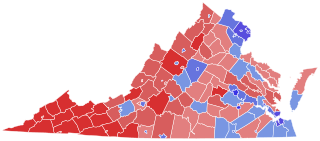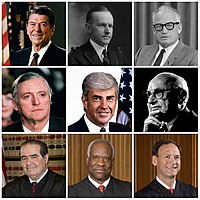Related Research Articles

The Federal government of Nigeria is composed of three distinct branches namely the legislative, executive, and judicial, whose powers are vested and bestowed upon them by the Constitution of the Federal Republic of Nigeria, the National Assembly, the President, and lastly the federal courts, which includes the Supreme Court which is regarded as the highest court in Nigeria respectively. One of the major functions of the constitution is that it provides for separation and balance of powers among the three branches and aims to prevent the repetition of past mistakes made by the government, some other functions of the constitution includes that it divides power between the federal government and the states and it also protects various individual liberties of the citizens of the nation.

The governor of the Commonwealth of Kentucky is the head of government of Kentucky. Sixty-two men and one woman have served as governor of Kentucky. The governor's term is four years in length; since 1992, incumbents have been able to seek re-election once before becoming ineligible for four years. Throughout the state's history, four men have served two non-consecutive terms as governor, and two others have served two consecutive terms. Kentucky is one of only five U.S. states that hold gubernatorial elections in odd-numbered years. The current governor is Andy Beshear, who was first elected in 2019.

The governor of the Commonwealth of Virginia serves as the head of government of Virginia for a four-year term. The incumbent, Glenn Youngkin, was sworn in on January 15, 2022.

The Parliament of Australia is the legislative branch of the government of Australia. It consists of three elements: the monarch, the Senate and the House of Representatives. The combination of two elected chambers, in which the members of the Senate represent the states and territories while the members of the House represent electoral divisions according to population, is modelled on the United States Congress. Through both chambers, however, there is a fused executive, drawn from the Westminster system.

The California State Legislature is a bicameral state legislature consisting of a lower house, the California State Assembly, with 80 members; and an upper house, the California State Senate, with 40 members. Both houses of the Legislature convene at the California State Capitol in Sacramento. The California state legislature is one of just ten full-time state legislatures in the United States. The houses are distinguished by the colors of the carpet and trim of each house. The Senate is distinguished by red and the Assembly by the color green, inspired by the House of Lords and House of Commons respectively.

The Virginia General Assembly is the legislative body of the Commonwealth of Virginia, the oldest continuous law-making body in the Western Hemisphere, the first elected legislative assembly in the New World, and was established on July 30, 1619. The General Assembly is a bicameral body consisting of a lower house, the Virginia House of Delegates, with 100 members, and an upper house, the Senate of Virginia, with 40 members. Combined, the General Assembly consists of 140 elected representatives from an equal number of constituent districts across the commonwealth. The House of Delegates is presided over by the Speaker of the House, while the Senate is presided over by the Lieutenant Governor of Virginia. The House and Senate each elect a clerk and sergeant-at-arms. The Senate of Virginia's clerk is known as the "Clerk of the Senate".

The California State Assembly is the lower house of the California State Legislature, the upper house being the California State Senate. The Assembly convenes, along with the State Senate, at the California State Capitol in Sacramento.
In the Parliament of Australia, a casual vacancy arises when a member of either the Senate or the House of Representatives:

The Illinois General Assembly is the legislature of the U.S. state of Illinois. It has two chambers, the Illinois House of Representatives and the Illinois Senate. The General Assembly was created by the first state constitution adopted in 1818. As of 2022, the current General Assembly is the 102nd.

The Senate of Puerto Rico is the upper house of the Legislative Assembly of Puerto Rico, the territorial legislature of Puerto Rico. The Senate, together with the House of Representatives of Puerto Rico, control the legislative branch of the government of Puerto Rico.

The House of Representatives of Puerto Rico is the lower house of the Legislative Assembly of Puerto Rico, the bicameral territorial legislature of Puerto Rico. The House, together with the Senate, control the legislative branch of the government of Puerto Rico.

The Australian Government, also known as the Commonwealth Government, is the national government of Australia, a federal parliamentary constitutional monarchy. Like other Westminster-style systems of government, the Australian Government is made up of three branches: the executive, the legislative, and the judicial.

The Virginia House of Delegates is one of the two parts of the Virginia General Assembly, the other being the Senate of Virginia. It has 100 members elected for terms of two years; unlike most states, these elections take place during odd-numbered years. The House is presided over by the Speaker of the House, who is elected from among the House membership by the Delegates. The Speaker is usually a member of the majority party and, as Speaker, becomes the most powerful member of the House. The House shares legislative power with the Senate of Virginia, the upper house of the Virginia General Assembly. The House of Delegates is the modern-day successor to the Virginia House of Burgesses, which first met at Jamestown in 1619. The House is divided into Democratic and Republican caucuses. In addition to the Speaker, there is a majority leader, majority whip, majority caucus chair, minority leader, minority whip, minority caucus chair, and the chairs of the several committees of the House.

The Senate of Virginia is the upper house of the Virginia General Assembly. The Senate is composed of 40 senators representing an equal number of single-member constituent districts. The Senate is presided over by the lieutenant governor of Virginia. Prior to the American War of Independence, the upper house of the General Assembly was represented by the Virginia Governor's Council, consisting of up to 12 executive counselors appointed by the colonial royal governor as advisers and jurists.

The Pennsylvania General Assembly is the legislature of the U.S. commonwealth of Pennsylvania. The legislature convenes in the State Capitol building in Harrisburg. In colonial times (1682–1776), the legislature was known as the Pennsylvania Provincial Assembly and was unicameral. Since the Constitution of 1776, the legislature has been known as the General Assembly. The General Assembly became a bicameral legislature in 1791.

The Nevada Senate is the upper house of the Nevada Legislature, the state legislature of U.S. state of Nevada, the lower house being the Nevada Assembly. It currently (2012–2021) consists of 21 members from single-member districts. In the previous redistricting (2002–2011) there were 19 districts, two of which were multimember. Since 2012, there have been 21 districts, each formed by combining two neighboring state assembly districts. Each State Senator represented approximately 128,598 as of the 2010 United States Census. Article Four of the Constitution of Nevada sets that State Senators serve staggered four-year terms.

The Maine Republican Party is an affiliate of the United States Republican Party in Maine. It was founded in Strong, Maine, on August 7, 1854. The party currently does not control the governor's office or either chamber of the Maine Legislature, nor either of Maine's two U.S. House seats and only controls one of the state's U.S. Senate seats.

The 2011 Kentucky gubernatorial election was held on November 8, 2011, to elect the governor of Kentucky and the lieutenant governor of Kentucky. Incumbent Democrat Steve Beshear won re-election, defeating Republican challenger David L. Williams, then the president of the state senate, and Gatewood Galbraith, an independent candidate. Statewide turnout in this election was 28%.

The 2020 United States Senate election in Virginia was held on November 3, 2020, to elect a member of the United States Senate to represent the Commonwealth of Virginia, concurrently with the 2020 U.S. presidential election, as well as other elections to the United States Senate in other states and elections to the United States House of Representatives and various state and local elections. Incumbent Democratic Senator Mark Warner won reelection to a third term against Republican nominee Daniel Gade.

Redistricting in Virginia has been a controversial topic due to allegations of gerrymandering. In the 2017 Virginia General Assembly, all of the redistricting reform bills were killed.
References
- ↑ "Mission – Virginia Tea Party Patriots". Archived from the original on 2013-05-06. Retrieved 2013-05-02.
- ↑ Sluss, Michael (June 7, 2012). "State Tea Party leaders back Radtke in Senate primary". Roanoke Times.
- ↑ "Virginia Tea Party Patriots" (PDF). Virginia Tea Party Patriots. Archived (PDF) from the original on 2014-05-31. Retrieved 2013-05-02.
